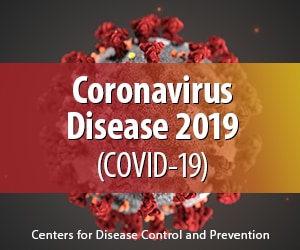
With the growing spread of COVID-19, we want to inform you that our health center is monitoring updates from the Centers for Disease Control (CDC), as well as from state and local health officials. If you have traveled to or from high risk countries in the past 30 days, or have been in close contact with someone with COVID-19 and have the following symptoms, please contact your doctor’s office:
- Fever
- Muscle aches
- Cough, with shortness of breath in more severe cases
COVID-19 is a new virus strain that is believed to spread in similar ways as the common cold, such as when an infected person coughs or sneezes. Please note that despite the daily worldwide increases in both new cases and fatalities associated with COVID-19, the CDC and other healthcare authorities are saying that the risk remains low for exposure in the U.S.
Protecting Yourself
Everyone should be mindful to protect themselves from COVID-19 infection in the same ways as you avoid contamination from seasonal flu and the common cold:
- Sanitize your hands often for at least 20 seconds each time, using ample amounts of soap and water. Make sure to wash between fingers and thumbs. When soap isn’t available, hand sanitizers works well, too.
- Use your hands to cover your cough or sneeze with a tissue, then immediately discard the tissue in the trash. Wash your hands afterwards.
- Avoid touching your eyes, nose and mouth with your hands.
- Stay home when you are sick and avoid close contact with people who are ill.
- Clean and disinfect frequently-touched objects and surfaces (like doorknobs and light switches).
- Get ample rest, drink plenty of fluids, eat healthy foods, and manage your stress to keep your immunity strong.
If You Believe You Are Sick
Self-quarantine at home or home isolation:
- Stay home if you believe you have been exposed to the virus, even if you are not showing symptoms. This is especially important if you have respiratory illness symptoms. Currently, these symptoms are more likely due to influenza or other respiratory viruses than to a COVID-19 infection. Whether you have seasonal flu, the common cold, or something else, it’s important to stay away from others.
- Monitor yourself for fever, coughing and shortness of breath.
- If you are concerned about having COVID-19, please contact your doctor or local health department for advice before scheduling an appointment. Please do not show up at the health center without first contacting your doctor or caregiver, if you are concerned that you may have COVID-19.
Specific Guidance for Higher Risk Individuals
Public health officials recommend that people at higher risk of severe illness should stay home, avoiding large groups including public places with large gatherings. People at higher risk are generally:
- Over 60 years of age
- With underlying health conditions, such as heart disease, lung disease, or diabetes
- With weakened immune systems
- Pregnant
There is no evidence that children are more susceptible to COVID-19, as most confirmed cases have occurred in adults. Caregivers of children with underlying health conditions should consult their doctor about whether their children should stay home.
Stay Informed
The CDC is monitoring the situation and posting updates about the virus, including everything you need to know about how the virus spreads, how it’s treated, how to protect yourself, and what to do if you get sick. There is also information on the state’s department of public health website:
CDC – https://www.cdc.gov/coronavirus/2019-ncov/index.html
CA Department of Public Health – https://www.cdph.ca.gov/Programs/CID/DCDC/Pages/Immunization/nCOV2019.aspx

